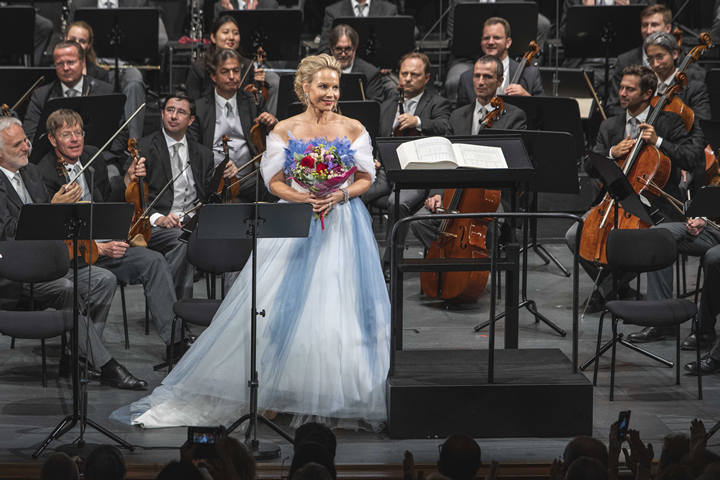| Opera Reviews | 19 April 2024 |
A stellar line-up delivers the goodsby Moore Parker |
|
Berlioz: La Damnation de Faust |
|

|
|
|
In a stellar line-up, Berlioz’ rarely-aired La Damnation de Faust returned to Salzburg (after more than two decades) for a single showing in concert at the Grosses Festspielhaus. Taking the title part, Charles Castronovo well-established the opening atmosphere in his "Le vieil hiver a fait place au printemps.." with finely-phrased, but surprisingly dark timbre. He presented a poised, appealing figure but as the evening progressed, battled at times with the part’s tessitura - unable to mix registers ideally - and resorting to pure falsetto on occasions which jarred in contrast to his standard - almost guttural - delivery. He, nevertheless, rose well to the challenge of “Natur immense” which saw the climax of a nicely-rounded performance. Mephistopheles - be it here or in Gounod or Boito - can easily become postured or “ham”, which are pitfalls Ildar Abdrazakov adroitly averted. The Russian’s generous bass easily rides Berlioz’ lines with ample reserve to play with tonal colours and dynamics - whether in "Une puce gentile", the seductive "Voici des roses", or his "Sérenéde" with the Will-o’-the-wisps. His interjections throughout were masterly, suave, and understated - scoring a hit which truly earned enthusiastic ovations from the house. Sporting larger-than-life hair and trailing gown, Elena Garanča made her entrance for Part III - looking absolutely exquisite. Her Marguerite eclipsed all expectations with a tone - matured - yet ideally candescent and fresh throughout its range. The legendary Kirsten Flagstad once said that giving birth had really taught her how to support the voice, and had promoted the development of her enormous Wagnerian soprano. Certainly - for whatever reason - Ms Garanča’s voice has now greatly increased in dynamics, dominating in ensemble moments yet capable of the finest line and nuance in her set pieces, "Autrefois un roi de Thulé", and "D’amour l’ardente flamme". The part of Brander offers good opportunity for a cameo showing - well-taken here by Peter Kellner, a young member of the Vienna State Opera ensemble who is deservedly making his way - not just in Austria, but in venues including The Royal Opera House, Covent Garden, as well as the Teatro Verdi in Triest and the Teatro de la Maestranza in Seville. Complimenting the four solo leads, the chorus functions as a vital fifth pillar, with a mammoth task throughout the evening and a variety of “roles” and theatrical situations to master. The Salzburger Festspiele und Theater Kinderchor joined forces with the Konzertvereinigung Wiener Staatsopenchor for the event. A little leaden to begin with (and occasionally out of beat), the ensemble soon caught fire and landed a colourful and appropriately bombastic contribution. Some of the evening’s highlights lay in the instrumental interludes - the Hungarian March, the Will-o’-the-wisp Minuet and the Ballet des Sylphes - all underscoring the many facets of the drama in a gripping, yet restrained, reading by Alain Altinoglu with the Wiener Philharmoniker.
|
|
Photo © SF / Marco Borrelli |
|







